 My impressions of Japan (both good and bad)
My impressions of Japan (both good and bad) My impressions of Japan (both good and bad)
My impressions of Japan (both good and bad)Everywhere I went, people were unusually and unnecessarily kind. They weren't trying to be kind, they just were. The friends I made were incredibly generous in every respect. I am overwhelmed with gratitude toward the people who spent lots of time introducing me to people, sights, and places they love in Japan.
This kindness isn't just for friends. The Japanese people I met were kind to everyone. One time, on the train, I saw an old drunk man (probably mentally ill) lying in the middle of the train talking about nonsense, some of it probably a bit obscene. He was dirty. The smell was enough to bother anybody in the same train car. The people around him just sat and watched with a sense of sympathy. Soon, the conductor came back and respectfully asked (in Japanese), "Where are you going? Is this the train you need?" The old man wasn't responsive, so the conductor said something like, "It would be better if you sat on the seat. Please." The old man still didn't respond. The conductor left him. At the next stop, a couple train security people got on. Though they were a bit more firm, they still treated the man with compassion and kindness. They gently led the man away from the train.
One more story of unusual kindness. In Hakodate (in Hokkaido), I stayed in a wonderful Japanese-style
inn called "Oyado Aozara". The night before, I had done laundry at a youth hostel and the dryer didn't
work well. So, I arrived in Hakodate with a bag full of damp clothes. When I told the manager, Sasamoto-san,
she led
me to a rack where I could hang them up. She immediately took down the clothes she had hanging and
insisted on staying and helping me hang my clothes. I told her my laundry should be my responsibility, but
she insisted. She wanted me to get out and see Hakodate sooner, I guess. So, I graciously accepted her
help. I went out for several hours and explored the area. When I got back, to my amazement, she had taken
down my clothes and folded them perfectly. Shirts, pants, t-shirts, socks, underwear, everything. Such
kindness is quite inspiring. Oh yeah, this room was not an expensive suite. The cost was about ¥3200 (US $28).

Everywhere you go in Japan, you see vending machines. In one block of one side of one street, you might see three.
It's incredible. In Hakodate, there is a famous mountain that people ascend to see the beautiful city lights at night.
I took a rope way to the top. To my surprise, there was an elaborate visitor center. Among other things, there were a
total of 23 vending machines.

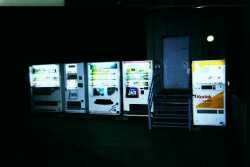
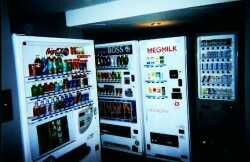
Japan has a world-famous emphasis on cleanliness. In general, streets and buildings are cleaner. Inside, you wear slippers, to prevent dirt from outside from reaching the inside floors. When you go to the bathroom, you wear a different pair of slippers, to prevent bathroom dirt from getting on the normal floors. Well, there's a reason for this.
Although many Japanese bathrooms were clean, many were quite smelly. In some (otherwise clean) hostels, the bathrooms
were so disgusting that I'd hold it until I could go to the train station or somewhere else. One reasons for the stench
was probably the squatter toilets (link). Since they are
not full of water, they don't suppress the smell. Also, some people say they are prone to accidents. Let it suffice to say
that once was enough for me.
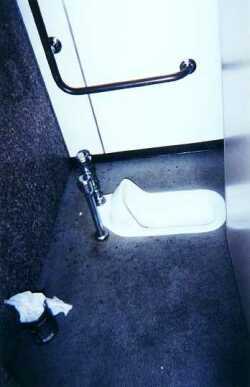
In the United States, people sometimes complain that Japanese food is bland and uninteresting. That's probably because they are eating it in the United States. Real Japanese cuisine is rich with flavors, textures, and smells.
Japan's cities seem much less structured than American cities. Buildings go anywhere and everywhere. There seems to be little or no regard for open space and casual city parks.
Near any famous temple or shrine, I found shops selling souvenirs. When I visited the famous Konpira-san shrine (link), I found maybe 20 small business along the approach to the shrine, all trying to sell you food, refreshments, souvenirs, or anything else. When you visit many Buddhist temples, there will be a shop next to the temple selling postcards and little trinkets to mark the occasion. It was surprising to see commerce so intertwined with religion.
Buses, trains, fast food, sightseeing, museums, cash machines, bookstores - everything seemed to be well suited for handling large numbers of people smoothly and efficiently. It was nice, especially in busy times and places.
In shopping areas, it seemed clear that things had extra value if they had connection to a foreign place. That place could be another Asian country, a European country, or the United States. These are people who value other cultures as well as their own.
I would estimate that 1/3 of the people I met spoke enough English to have a meaningful conversation. Even people who claimed to speak no English knew some nouns or something. Usually, they'd say that they don't know English, but they wish they did. It was almost like being thin in the United States. Some people are thin. Quite a few people are not as thin as they want to be. Some people don't care. A large industry exists to help people lose weight (e.g. Jenny Craig, Weight Watchers, etc.). Indeed, leaning English in Japan is a big industry (e.g. Nova, GEOS, AEON, etc.).
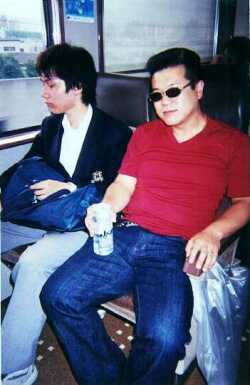
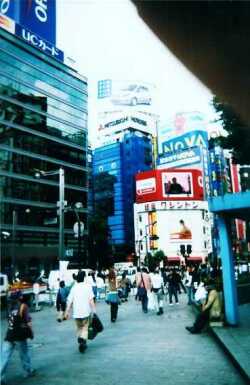
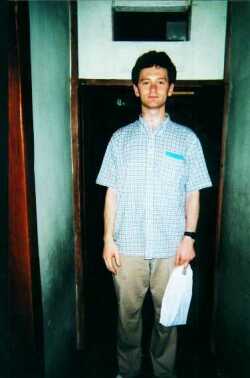

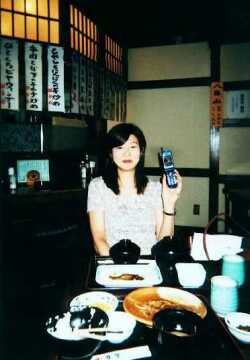
Last updated 7/8/03